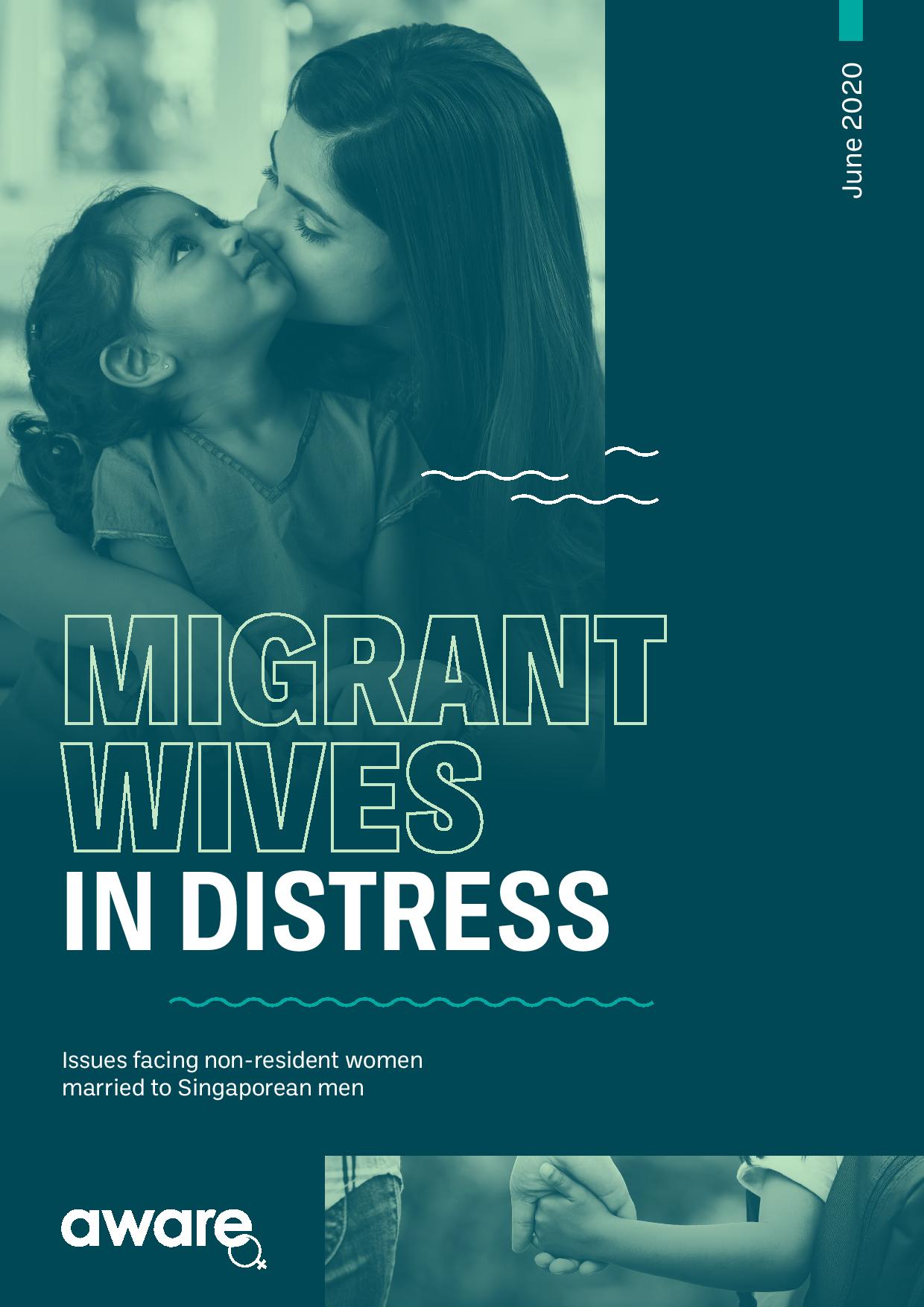-
Advocacy Theme
-
Tags
- Abortion
- Adoption
- Caregiving
- CEDAW
- Disability
- Domestic Violence
- Domestic Workers
- Harassment
- Healthcare
- Housing
- International/Regional Work
- Maintenance
- Media
- Migrant Spouses
- Migrant Workers
- Muslim Law
- National budget
- Parental Leave
- Parenthood
- Polygamy
- Population
- Race and religion
- Sexual Violence
- Sexuality Education
- Single Parents
- Social Support
- Sterilisation
- Women's Charter
Immigration policies disadvantage migrant wives in the areas of family violence, divorce and housing: AWARE study
June 1st, 2020 | Family and Divorce, Gender-based Violence, Migration and Trafficking, News, Press Release
This post was originally published as a press release on 1 June 2020.
1 June 2020 – Migrant wives are more vulnerable than Singaporean women to family violence, and face disadvantages in divorce, as they lack the independent right to reside in Singapore.
Those are the findings of gender-equality organisation AWARE’s new report, “Migrant Wives in Distress: issues facing non-resident women married to Singaporean men”. The report was compiled through analysis of AWARE’s Women’s Helpline calls between 2016 and 2018, as well as legal clinic sessions and local research on migrant wives of citizens in Singapore.
Women make up 70% of all migrant spouses in Singapore. Unless they have a work visa, these non-residents depend entirely on their citizen spouses for the right to reside in the country. The power imbalance that arises can lead to abuse and violence on the citizen spouses’ part. AWARE found that migrant spouses called the Helpline about family violence at twice the rate of local women (27.5% vs 13%). Since January this year, at least 20 migrant wives have called AWARE because of family violence or abuse.
Migrant wives meet additional obstacles in the areas of housing (e.g. ownership of public housing flats after the citizen spouse passes away) and divorce (e.g. contesting claims and obtaining custody). Migrant mothers who undergo divorce often face the painful prospect of separation from their children.
“Our hidebound immigration policies inadvertently compound the challenges of migrant wives,” said Ms Shailey Hingorani, AWARE’s head of Research and Advocacy. “These women are integral parts of Singapore communities and families, yet too often they are treated as visitors.”
“What’s more, COVID-19 is worsening their situations. Non-residents are not eligible for the same relief schemes as Singaporeans, and their chances of employment are diminished,” Ms Hingorani added. “When it comes to abuse, we know that it’s already hard for Singaporean women to seek support. All the more so for migrant wives: Being isolated from their local networks makes it especially difficult for them to overcome language barriers, financial dependency and confusion about their own rights.”
To provide greater protection, AWARE recommends that the government allow abused migrant spouses to renew their Long-Term Visit Passes independently of their citizen spouses.
“I applaud AWARE’s outstanding efforts in reaching out to one of the most vulnerable populations in Singapore,” said Dr Quah Ee Ling Sharon, author of Transnational Divorce and Perspectives on Marital Dissolution. “They recommend important and urgent interventions to support these women from imminent disposability and debilitating outcomes. I hope their proposals will be considered seriously. As a nation, taking care of your population, whether they are residents or not, is the right thing to do.”
Read the full “Migrant Wives in Distress” report here.
ANNEX
AWARE Helpline Caller: Ana*
Ana* is a Filipina woman on a Long-Term Visit Pass. Her husband has been physically abusive with her for a few years, since she found out about his infidelity and confronted him about it. When she took out a Personal Protection Order (PPO) against him in 2014, he was shocked that “foreigners have that power”. Her husband has threatened to cancel her LTVP and make new passports for her children. (She holds their current passports.) Ana withdrew the PPO after her husband repented and begged her to do so. However, the abuse soon resumed. At the time she called AWARE’s Helpline, Ana had moved out; her husband had just punched and kicked her.
*Name changed to protect her identity




